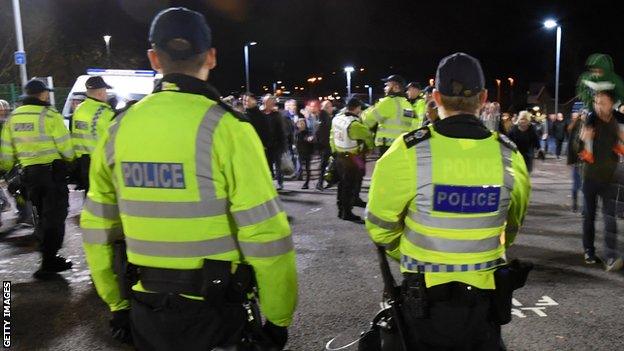Football hate crime at matches in England and Wales rose by 47% last season
- Published

Racism was reported at 152 matches in the 2018-19 season, up from 94 in the previous period.
Incidents of hate crime at football matches in England and Wales rose by 47% last season, according to new Home Office figures.
In the 2018-19 season there were hate crime incidents - 79% of which related to race - at 193 matches, up from 131.
Manchester City's Raheem Sterling and Arsenal's Pierre-Emerick Aubameyang were among Premier League players targeted.
But football-related arrests dropped overall by 10% to 1,381 in 2018-19.
The Home Office report said the rise in hate crime is likely to be partially down to improvements in recording incidents at matches.
Anti-discrimination charity Kick It Out described the figures as "a serious concern".
The organisation added: "It's encouraging to see that more people are comfortable reporting discrimination and we are working hard to make this as easy as possible for all to do, but it is undeniable that we are experiencing a rise in hateful behaviour across the game and wider society.
"These figures should serve as a reminder for football - we must increase our efforts to send a clear message to any fan who discriminates at a match: you will be identified, arrested and face a football banning order."
In a statement, the Football Association said: "We strongly condemn all forms of discrimination and encourage all fans and participants who believe that they have been the subject of, or witness to, discriminatory abuse to report it through the appropriate channels.
"Incidents of anti-social and discriminatory behaviour can be reported to the relevant club, matchday stadium security, the police, Kick It Out or directly to The FA.
"We work closely with key stakeholders across the game, including the Leagues and Kick It Out, to make it clear that football is an inclusive game and that discrimination, in any form, will not be tolerated."
'Some clubs see football policing as escapable costs'
Deputy Chief Constable Mark Roberts, from the National Police Chief's Council, says the scale of the problem could be worse but there are not enough police present at matches to respond to and report incidents, particularly in the lower divisions.
DCC Roberts has criticised some football clubs for cutting back on policing costs while simultaneously paying millions of pounds on transfers and wages.
"There's a problem with policing numbers at lower-league matches in particular. Some Football League clubs see football policing as escapable costs," he said.
"They're more than happy to pay extortionate fees to agents for sometimes average players in terms of salary and transfer fees but the policing bill seems to be one they think they can cut back on, and I think that's a false economy.
"Home Office statistics show football disorder remains at concerning levels - over the past two seasons, incidents reported are at more than 1,000 fixtures, and worryingly, this is becoming the new normality.
"With the absence of police officers to witness and respond, we are reliant on supporters and other agencies to report matters to us, so there could be a lot that goes unreported.
"There is also a reluctance from the leagues to share safety officer's reports with us at a national level."
Government data from the Home Office , externalalso showed:
Stoke (80) had the highest number of arrests, 62 of which were related to a single match - their Checkatrade Trophy trip to local rivals Port Vale in December 2018.
Leeds (49) and Aston Villa (42) had the next highest number of arrests.
The number of arrests for racist and indecent chanting fell from 15 in 2017-18 to 14 in 2018-19.
However, that is still twice the number of arrests - seven - for the same offence in 2016-17.
The most common types of offences were public disorder (38%) and violent disorder (19%).
Stoke supporters were issued the highest number of new banning orders during the 2018-19 season - 46.
Newcastle have the most banning orders overall at 71.
It is the seventh consecutive year reported incidents of discrimination within football have increased, and the 581 total reports of hate crime is more than double the figure from five years ago.
The 152 matches at which there was racist abuse was an increase of 51% on the previous year.
England star Sterling, 24, has spoken out on social media, suggesting newspapers' portrayal of black players fed prejudice and aggressive behaviour.
The Manchester City forward has been praised for being a role model and won last season's Football Writers' Association Footballer of the Year award.
In a statement, Stoke said: "The latest Home Office statistics do not make for pleasant reading, but to provide some context 62 of the 80 arrests were as a result of anti-social behaviour that occurred both during and after the Checkatrade Trophy fixture against Port Vale in December 2018.
"Of the other 18 arrests, only five of those were made at home fixtures at the bet365 Stadium where, working in partnership with the police and authorities, we are continuing to do everything we can to try and eradicate anti-social behaviour from football."